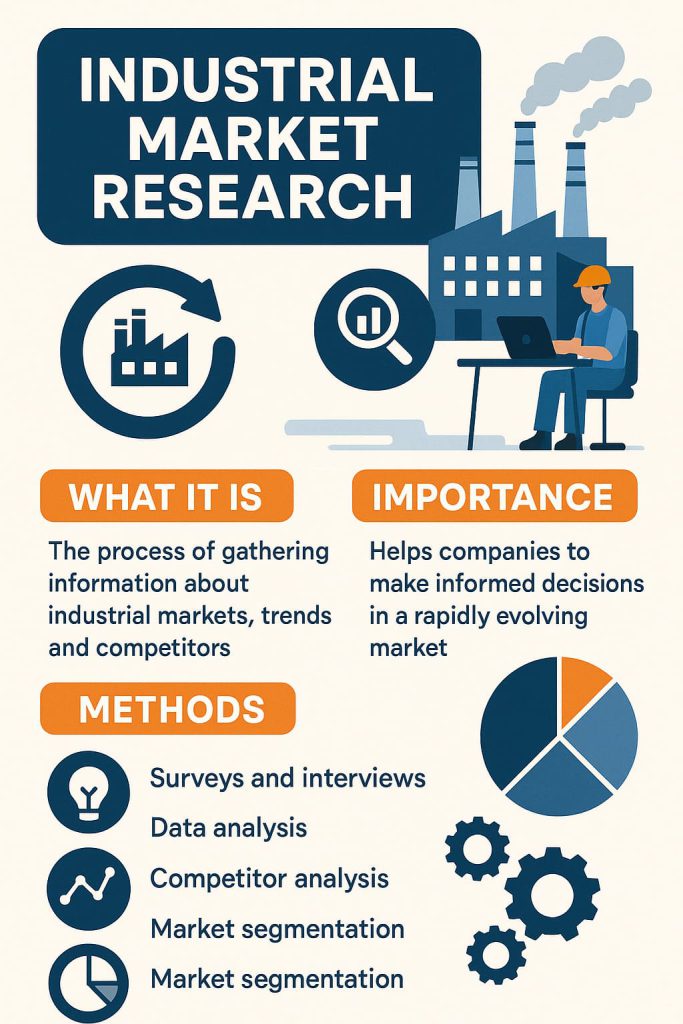Industrial Market Research and Strategy

Have you ever wondered how industries forecast growth, identify challenges, or pinpoint new areas of opportunity? The answer lies in industrial market research and strategy consulting. This market research helps industries to understand market dynamics, trends, and various influential factors, guiding strategic decisions and ensuring optimal growth. What exactly is industrial market research? Let’s delve into its core and see how it shapes the industrial landscape.
Table of Contents
✅ Listen to this PODCAST EPISODE here:
Understanding Industrial Market Research & Strategy
Industrial market research is a comprehensive study of market conditions, behaviors, and trends within the industrial sector. Unlike consumer market research, which focuses on individual consumers, industrial market research focuses on businesses and organizations. This includes studying the purchasing habits, needs, and preferences of other businesses. Furthermore, it encompasses exploring supply chain dynamics, understanding the competitive landscape, and analyzing potential areas for innovation.
A significant aspect of industrial market research is its emphasis on long-term relationships, as transactions are typically larger, the sales cycle is longer, and purchasing decisions are often based on strategic considerations rather than impulsive behavior. As such, this market research considers elements like contract negotiations, bulk buying, and long-term supply agreements.
On the other hand, industrial strategy consulting assists businesses in the industrial sector navigate complex market dynamics, technological advancements, and evolving competitive landscapes to achieve sustainable growth and operational efficiency. It addresses the unique challenges faced by industrial companies, ranging from manufacturing and logistics to energy and construction.
Figure 1. Industrial Research: Technology Adoption & Market Trends
Industrial Research: Technology Adoption & Market Trends
Digital transformation and innovation trends in B2B market research
- • Online/Mobile Research: 35%
- • Reporting Services: 20.2%
- • Web Analytics: 9.7%
- • Qualitative Research: 6%
- • Real-time Data Analytics
- • Sustainability Focus
- • Digital Transformation
- • Personalized B2B Experiences
Data Sources
- • Technology Trends: Backlinko Market Research Statistics
- • Industrial Analysis: HelloMrLead B2B Industrial Analysis
- • Competitive Intelligence: ProductiveShop CI Research
- • B2B Marketing: SellersCommerce B2B Statistics
- • Industry Insights: SIS International Industrial Research
The role of an industrial strategy consultant involves analyzing a company’s existing operations, market position, and competitive environment. They delve into supply chain management, production processes, technology integration, and market expansion opportunities. The consultant then leverages this analysis to craft a comprehensive strategy that encompasses not only operational improvements but also innovation and growth initiatives. This might include adopting new technologies like IoT and AI, entering new markets, optimizing resource allocation, or restructuring operations for greater efficiency.
Industrial Market Research & Strategy Explained

Industrial strategy research refers to the approach marketers use to gather information about competition, supply chains, and industry trends. Knowledge gleaned from this kind of research can give companies an edge over their competition. It involves the following solutions:
- Market Opportunity Assessments
- Market Entry, Feasibility & Sizing
- Customer Research
- Competitive Intelligence & Analysis
- Best Practices Research
- Win/Loss Research
- Channel Intelligence
- Distributor Research
Industrial strategy research evaluates the existing market competition by assessing competitors’ business plans. Secondary research connects already available data to validate and triangulate findings. Strategy Research helps determine the market segments a company should target moving forward.
We explore our clients’ strategic priorities, objectives, strengths and weaknesses to design projects that will have a lasting impact. Asking appropriate and relevant questions is key in Industrial Strategy Research. Having a firm understanding of how competitors may react to new strategies can also strengthen the strategic movements a company decides to make.

Advantages of Industrial Market Research & Strategy
Industrial strategy consulting offers significant advantages for businesses seeking to develop client-centric solutions, which are essential in today’s highly competitive and customer-oriented industrial markets. Here’s how this specialized consulting leads to more effective, tailored solutions for clients:
- Deep Understanding of Client Needs and Challenges: Industrial strategy consultants excel in deeply understanding the specific needs, challenges, and objectives of their clients. This involves thorough market research and analysis, combined with direct client engagement to grasp the nuances of their operational environment and customer base. Such an in-depth understanding is crucial for developing solutions that are truly aligned with client requirements.
- Tailored Strategy Development: One of the key strengths of industrial strategy consulting is the ability to develop customized strategies tailored to each client’s unique context. Unlike one-size-fits-all solutions, these strategies take into account the client’s specific market position, operational capabilities, and long-term goals, ensuring solutions are not only effective but also viable and sustainable.
- Integration of Latest Industry Trends and Innovations: Consultants bring a wealth of knowledge regarding the latest industry trends, technologies, and best practices.
- Enhanced Customer Focus: Industrial strategy consulting helps businesses to realign their operations and strategies with a strong customer focus. This could involve reengineering processes, adopting new technologies, or reshaping the organizational culture to be more customer-centric, all of which help create solutions that better meet customers’ needs and expectations.
- Objective Outside Perspective: Consultants provide an external, objective perspective that can be invaluable in identifying areas for improvement or innovation that may not be evident from within the organization.
Table 1. Industrial Market Research: Industry Intelligence & Data
Industrial Market Research: Industry Intelligence & Data
Comprehensive market data for B2B and industrial sector research
Differences Between Industrial Market Research and Industrial Strategy Consulting
Industrial market research and industrial strategy consulting are two distinct yet interrelated fields, each playing a vital role in the business landscape, particularly in the industrial sector. Understanding their differences is key for businesses aiming to leverage each other effectively.
Industrial Market Research
- Data-Driven Analysis: Industrial Market Research focuses on collecting and analyzing data related to the industrial sector. This includes market trends, competitor analysis, supply chain dynamics, pricing strategies, and customer preferences. The aim is to gather factual, quantitative information that provides a clear picture of the market landscape.
- Descriptive Insights: The outcome of market research is typically descriptive, offering insights into what is happening in the market at present or in the past. It helps businesses understand their position in the market, the competitive environment, and potential market opportunities or threats.
- Objective Approach: Market research strives for objectivity, aiming to provide unbiased insights based on data. It often involves primary research (like surveys, and interviews) and secondary research (like industry reports, and databases) to gather comprehensive market intelligence.
- Foundational for Decision Making: Insights from industrial market research provide a foundation for informed decision-making. Businesses use this information to understand where they stand and to identify potential areas for growth or improvement.
Industrial Strategy Consulting
- Strategy Development and Implementation: Industrial strategy consulting goes beyond data analysis to develop and implement strategies that address specific business challenges and goals. It’s about applying the insights from market research to create actionable plans that drive growth, efficiency, and competitive advantage.
- Future-Oriented and Prescriptive: Unlike market research, strategy consulting is prescriptive and future-oriented. Consultants provide recommendations and strategies for businesses to follow, considering future market trends and potential disruptions.
- Customized Solutions: Strategy consulting offers solutions that are tailored to the specific needs and circumstances of a business. Consultants consider the unique aspects of each business, including their resources, capabilities, and market position, to develop a customized strategy.
- Hands-On Approach: Consultants often work closely with the business throughout the implementation of the strategies. This can include change management, process optimization, and ongoing support to ensure the effective execution of the strategies.
- Focus on Problem-Solving and Innovation: Strategy consulting often involves problem-solving and innovation. Consultants help businesses identify and tackle specific challenges, such as entering new markets, optimizing operations, or leveraging new technologies.

Benefits of Industrial Market Research
Studies show that firms that conduct market research grow faster and are more profitable than firms that don’t. While research costs can vary widely depending on the size of the sample needed and the method used for research, the return on investment is always positive.
If firms effectively use research findings to shape staff behavior and to adjust strategy, and if they are deliberate in their approach to doing so, they will reap the generous benefits the expert market research can provide. Our experienced researchers bring a wealth of industry expertise to make our industrial market research engagements produce uniquely valuable and immediately actionable insights.
- Informed Decision-Making: With industrial market research, businesses get a clearer picture of their market dynamics. This clarity, coupled with actionable insights, drives better decision-making processes. Companies can gauge which investments are likely to yield higher returns and avoid pitfalls that might otherwise go unnoticed.
- Spotting Market Trends: The industrial landscape is in perpetual motion. so market research empowers businesses to identify emerging market trends before they become mainstream. By staying ahead of the curve, businesses can strategize to leverage these trends, giving them a competitive edge.
- Understanding Customer Needs: At the heart of every successful industrial venture lies a deep understanding of customer needs and preferences. Industrial market research delves deep into customer behavior, allowing businesses to tailor their offerings to precisely what the market demands.
- Risk Mitigation: The industrial sector often involves hefty investments and long-term commitments. Industrial market research can act as an early warning system, helping businesses to identify potential risks and navigate around them, ensuring the sustainability and growth of the enterprise.
- Benchmarking Performance: How does one’s business stack up against the competition? Industrial market research provides valuable insights into competitors’ strategies, strengths, and weaknesses. It allows for an objective comparison and offers insights into areas of improvement.
- Facilitating Innovation: The modern industrial sector thrives on innovation. Market research can highlight market gaps, potential product development areas, and unmet customer needs, serving as a springboard for innovative solutions.
- Cost Savings: By identifying operational inefficiencies or areas where customers see little value, industrial market research can guide companies in resource allocation. This ensures that businesses are not spending unnecessarily but are investing where the impact will be greatest.
- Global Expansion: As businesses contemplate venturing into international markets, this market research becomes their ally. It offers insights into cultural nuances, market preferences, regulatory landscapes, and potential barriers to entry into foreign markets.
Main Emerging Trends

The ever-evolving nature of the industrial sector ensures that the methodology and focus areas of industrial market research remain changing. Recognizing and adapting to these trends can be the differentiator between a thriving enterprise and one that struggles to keep pace. Let’s explore some of these leading-edge trends:
- Integration of Advanced Analytics: The introduction of Big Data and machine learning into market research has revolutionized the insights businesses can garner. Advanced analytics can predict market shifts, analyze complex datasets, and provide businesses with a level of insight previously unattainable.
- Emphasis on Sustainability: As global consciousness shifts towards sustainability and eco-friendliness, industrial market research has followed this trend. Research is increasingly focusing on sustainable practices, green technologies, and the market’s reception to environmentally conscious endeavors.
- User Experience (UX) Research: While traditionally more associated with the tech and digital sectors, UX is becoming a focal point in industrial market research too. Understanding the user’s journey, from product discovery to purchase and post-purchase interactions, is becoming paramount.
- Real-time Data Collection: With the advancements in IoT (Internet of Things), industrial market research is moving towards real-time data collection. Sensors, connected devices, and smart machinery provide real-time data, enabling businesses to respond to market changes instantly.
- The shift from Quantitative to Qualitative: While numbers and statistics will always be the backbone of research, there’s an increasing emphasis on qualitative insights. Deep interviews, ethnographic studies, and participatory observations are gaining traction.
- Personalization of the Industrial Buyer’s Journey: B2B buyers now expect a B2C-like experience. Industrial market research is adapting by focusing on how businesses can personalize the buying experience for other businesses, understanding their unique needs, pain points, and preferences.
- Virtual Reality (VR) and Augmented Reality (AR) in Research: VR and AR are not just for gaming. These technologies are making inroads into market research, allowing businesses to simulate products, processes, and market scenarios, leading to more informed decisions.
- Focus on Digital Transformation: As industries evolve in the digital age, industrial market research is placing emphasis on understanding digital transformation’s impact on various sectors. This encompasses everything from automation and AI to blockchain applications in the industrial realm.
The Importance of Industrial Market Research
In the ever-evolving landscape of the industrial sector, why is industrial market research so important for success?
Firstly, businesses operate in a world filled with competition, and understanding one’s position in the market is crucial. Therefore, industrial market research offers an invaluable lens to view market dynamics, competitor strategies, and potential threats and opportunities.
When industrial businesses can grasp the intricacies of their industry, they stand a better chance of identifying untapped potential. For instance, market research might reveal gaps in the market where a business can introduce a novel product or service. Or it may bring to light areas where operational efficiencies can be enhanced, yielding cost savings.
Moreover, the industrial sector is characterized by long-term contractual commitments and high-stakes decisions. A business cannot afford to go into these situations blindly. This market research provides the data and insights necessary to make informed decisions, whether it’s entering a new market, forming strategic alliances, or innovating in product development. In essence, it’s the tool that transforms raw data into actionable intelligence.
Methodologies
Having a deep understanding of your product users is invaluable. Through in-depth interviews, CATI studies, consumer surveys, and focus groups, companies gain insight and data on customer purchasing, attitudes, branding and image awareness. Industrial Competitive Intelligence and competitor profiling can deliver meaningful advantages in the industrial marketplace. Companies can also gain insight into supply chain effectiveness and zero-in on important logistical aspects of transportation and procurement which can be improved.

Our Facility Location in New York
11 E 22nd Street, Floor 2, New York, NY 10010 T: +1(212) 505-6805
About SIS International
SIS International offers Quantitative, Qualitative, and Strategy Research. We provide data, tools, strategies, reports, and insights for decision-making. We also conduct interviews, surveys, focus groups, and other Market Research methods and approaches. Contact us for your next Market Research project.


